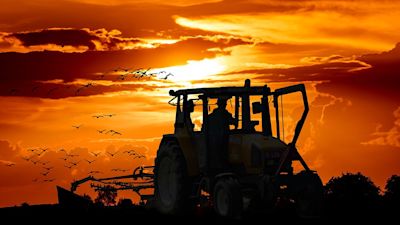UK dairy farmers producing half the global average of CO2 as Welsh Government opens funding pot

A budget of £2m will soon be available for farmers to invest in new technology and equipment to improve their technical, financial and environmental performance, the Welsh Government says.
The window to apply for the 'Farm Business Grant' will run from 1 September to 1 October and successful applicants will have four months to purchase and claim for any items.
It comes as a global dairy brand Arla Foods says UK dairy farmers using data to drive down the carbon footprint of their milk.
The budget allocated to this round of the Farm Business Grant comes from funds remaining within the Rural Development Programme.
Speaking ahead of a visit to the Pembrokeshire Show Minister for Rural Affairs Lesley Griffiths MS said: "I would urge farmers with an interest to start thinking now of the improvements they want to make and how the grant could help them so they are able to put in a strong expression of interest within the timescales and which meets their needs."
A new report by farmer-owned cooperative Arla Foods has outlined the collective carbon footprint of 1,964 UK dairy farms.
'A Sustainable Future for British Dairy' report details the emerging technologies being trialled by farmers, as the sector works to meet its target of a 30% reduction of CO2 per kg of milk by 2030.
The largest causes of dairy farming emissions come from six main areas:
The report showed that British farmers are producing milk with 1.13kg CO2 per kg – around half the global average.
It also revealed the most common areas which farmers will focus on to reduce emissions further, and the emerging technologies being trialled, as farmers continue their journey to meet their science-based targets of a 30% reduction of CO2 per kg of milk by 2030.
Solutions to reducing dairy emissions according to Arla foods:
Generating renewable energy from wind or solar.
Using precision techniques when spreading slurry, reducing air born ammonia by between 30% and 90%
Covering slurry tanks and harnessing its power through anaerobic digestors on farm.
Researching how to speed up carbon sequestration (the process of carbon being taken out of the atmosphere by trees, grass, or hedgerows)
Supporting current research to provide greater clarity around the difference in the impact of methane and CO2 and develop an understanding of how to deal with biogenic methane.
Developing and trialling new technologies to continue to enhance animal welfare
Arla foods says there is no one sustainable way to farm. Every decision a farmer takes can have a knock-on impact to emissions across their farm, and they must balance resources to have the lowest environmental impact overall.